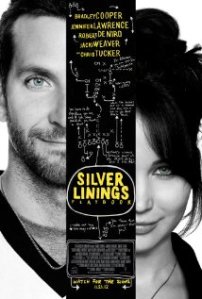 The only things I knew about Silver Linings Playbook before seeing it were its IMDB rating (8.3); its Metacritic rating (81); and that Jennifer Lawrence and Bradley Cooper starred. It’s interesting going into a film knowing little except that it is getting good reviews and that you definitely like one of the stars (Jennifer Lawrence): it makes me wonder how much this knowledge affects my opinion of the film. Whether the good reviews swayed me or not, in the end I did really like it (despite it having a very irritating and hard-to-remember name). Silver Linings Playbook is my favourite kind of comedy: quirky, fun, no slapstick, and with an undercurrent of seriousness. The film is about mental illness but it does not stereotype; it deals with the difficulties of bipolar disorder and depression with both humour and compassion. At its root, the film is a romantic comedy, a genre that with some notable exceptions, tends to produce very predictable films. I’m not going to say that Silver Linings Playbook is not predictable because it is. But about halfway through, as I was mindlessly stuffing my friend’s bag of popcorn down my throat, I realized I was engrossed in this film. This does not happen to me very often in romantic comedies. Up until that point there had been no cheese factor, and I started to wonder if somehow this romantic comedy would wrap itself up with a happy ending and not be cheesy. I concluded that it would not be possible and that I should probably brace myself for what would likely be a roll-my-eyes, predictable ending. I was pretty much spot on, but the ending was at least mercifully short (and with some moments of humour to soften the blow). All in all, this is no revolutionary romantic comedy, but the acting is terrific (Robert DeNiro has a particularly touching moment), it is legitimately funny, and the characters feel believably real. And sometimes, there is just nothing wrong with a feel-good film, complete with a happy ending and just enough sappiness to make you tear up.
The only things I knew about Silver Linings Playbook before seeing it were its IMDB rating (8.3); its Metacritic rating (81); and that Jennifer Lawrence and Bradley Cooper starred. It’s interesting going into a film knowing little except that it is getting good reviews and that you definitely like one of the stars (Jennifer Lawrence): it makes me wonder how much this knowledge affects my opinion of the film. Whether the good reviews swayed me or not, in the end I did really like it (despite it having a very irritating and hard-to-remember name). Silver Linings Playbook is my favourite kind of comedy: quirky, fun, no slapstick, and with an undercurrent of seriousness. The film is about mental illness but it does not stereotype; it deals with the difficulties of bipolar disorder and depression with both humour and compassion. At its root, the film is a romantic comedy, a genre that with some notable exceptions, tends to produce very predictable films. I’m not going to say that Silver Linings Playbook is not predictable because it is. But about halfway through, as I was mindlessly stuffing my friend’s bag of popcorn down my throat, I realized I was engrossed in this film. This does not happen to me very often in romantic comedies. Up until that point there had been no cheese factor, and I started to wonder if somehow this romantic comedy would wrap itself up with a happy ending and not be cheesy. I concluded that it would not be possible and that I should probably brace myself for what would likely be a roll-my-eyes, predictable ending. I was pretty much spot on, but the ending was at least mercifully short (and with some moments of humour to soften the blow). All in all, this is no revolutionary romantic comedy, but the acting is terrific (Robert DeNiro has a particularly touching moment), it is legitimately funny, and the characters feel believably real. And sometimes, there is just nothing wrong with a feel-good film, complete with a happy ending and just enough sappiness to make you tear up.















